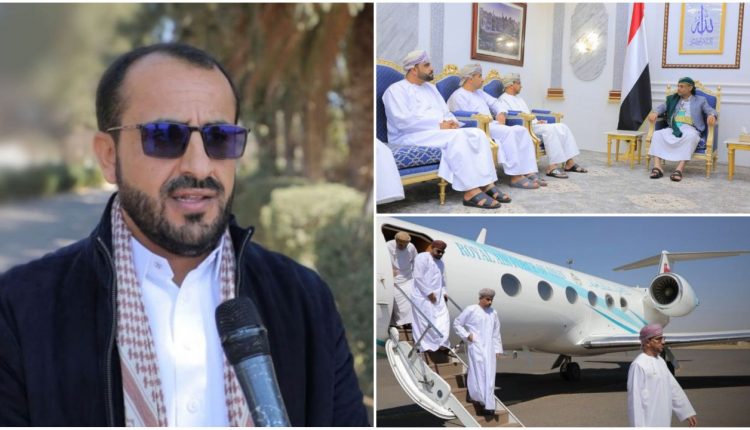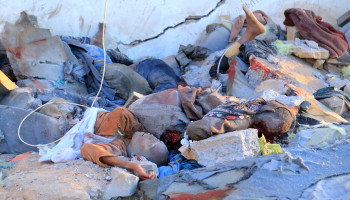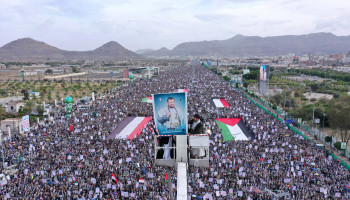The head of the National Delegation, Mohammad Abdulsalam, confirmed that the visit of the Omani delegation comes to communicate the ideas and proposals that were carried out in the discussions with the Saudis and international parties.
Abdulsalam said, in a statement to Almasirah, that the US-Saudi aggression makes promises that have no effect regarding the payment of state employees salaries, the end of the siege, and the departure of foreign forces.
He added that the aggression targeted the economic situation and greatly deepened the suffering by targeting the central bank and the currency.
Abdulsalam stressed the need to separate the humanitarian issue from military conflict, indicating that Sana'a's demands a solution to all Yemenis, without exception, throughout the territory of Yemen.
Abdulsalam linked any progress in the negotiations to progress in the humanitarian issue represented in the payment of salaries and the opening of airports and ports, stressing that the salary issue must be separated in all circumstances.
Abdulsalam praised the role of the Sultanate of Oman, which is keen to achieve peace in Yemen as a matter of interest and neighborhood, and its role in the talks with all parties is important and positive.
He stated that the brothers in Oman provided a lot of support to achieve peace in Yemen and in the humanitarian issue, and their frequent visits to Sana'a are evidence of their good efforts.
An Omani delegation arrived this morning, accompanied by the head of the national negotiating delegation, Mohammed Abdulsalam, to discuss the latest developments in light of the intransigence of the aggression coalition and its refusal to stop the aggression, lift the siege and pay salaries to all state employees.
In August, the Omani Delegation ended its visit to Sana’a after holding several important meetings.
The head of Nationnal Delegation, Mohammed Abdulsalam, stated, in a tweet, that Omani Delegation meetings with Sayyed Abdulmalik Al-Houthi and President Mahdi Al-Mashat focused on the UN-sponsored truce's path.
He pointed that Omani Delegation's meetings discussed humanitarian and military truce, paying employees, enhancing opportunities of ending the aggression and lifting siege.
The head of National Delegation welcomed the Omani efforts related to the payment of salaries, the opening of Sana'a airport and port of Hodeidah and entering into a real truce. He pointed that UN was informed with the outcomes of discussions that were taken which are related to paying salaries and opening Sana'a airport and Hoeidah port.
The aim of the Omani delegation's visit to Sana'a is to consult with the leadership on developments related to the truce and the UN-envoy's suggestions on humanitarian and economic issues.
"We arrived in the capital, Sana'a, this afternoon, via an Omani plane, accompanied by a delegation from the sisterly Sultanate of Oman, to consult with the leadership on developments related to the truce, and the suggestions made by the UN representative to address humanitarian and economic issues," the head of the National Delegation Mohammad Abdulsalam said.
A UN-brokered truce lasted for six months in the seven-year-old war waged by Saudi Arabia and its regional allies supported by US and western countries against Yemen.
The truce first came into effect on 2 April, and for an initial two months. It was renewed for another two months in June. The truce has been renewed for an additional two months through 2 October.
The deal stipulated halting offensive military operations, including cross-border attacks, and allowing fuel-laden ships to enter Yemen's lifeline Hodeidah port and commercial flights in and out of the airport in the capital Sana'a "to predetermined destinations in the region."
However, in light of UN silence, the Saudi-led aggression was still obstructing flights to the Sana'a International Airport in Yemen’s capital and detaining fuel ships that were headed to the country. The fires of the aggression side did not subside along the fronts, on the borders and inside, including shelling, reconnaissance, development and crawl.
When the period specified for the military and humanitarian truce was nearing its end, the US-Saudi aggression seemed to be in a hurry to adopt the option of extending it for the third time to freeze the battle in Yemen and its economic repercussions away from global energy markets.
The forces of aggression are pushing for an extension, not out of concern for peace, but rather out of fear that the escalation will add more complications to the international scene in addition to the crisis imposed by the Russian-Ukrainian war.
A truce, the positive effects of which have not been felt by the citizens over the past months, despite its broad headlines. Commercial flights to Cairo are still stumbling until today, and the navy of aggression continues to pursue fuel ships without respect for agreements or any regard for international laws and norms.
The truce, however, expired amid the Saudi-led coalition’s constant violations of the agreement and its refusal to properly lift a siege that it has been enforcing against Yemen since the beginning of the war.
The Supreme Political Council required, in order to extend the truce, the commitment of the Saudi-led aggression to pay the salaries of all employees and the rest of the services, as a natural entitlement that is not subject to extortion. Before that, the complete blockade of Sana’a airport and the port of Hodeidah must be lifted as a criterion for demonstrating the seriousness and goodwill in the faltering peace process in Yemen.
Although the US-Saudi aggression seeks to extend thetruce, it with UN complicity, is still evading the implementation of humanitarian and legal entitlements, foremost of which is the paying employee salaries and entering fuel ships to the port of Hodeidah, which made Sana’a refuse to extend the temporary truce.
The head of the National Delegation Mohammed Abdulsalam censured the aggressor coalition for failing to renew the truce deal and deteriorating the humanitarian crisis in the country as a result of its intransigence and disavowal of measures that alleviate the suffering of the Yemeni people.
Source: Almasirah Website.







